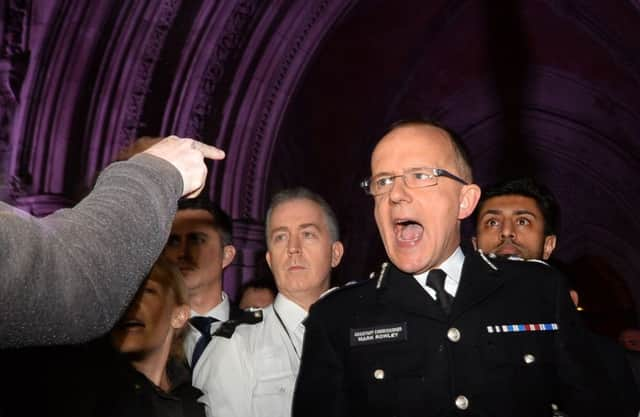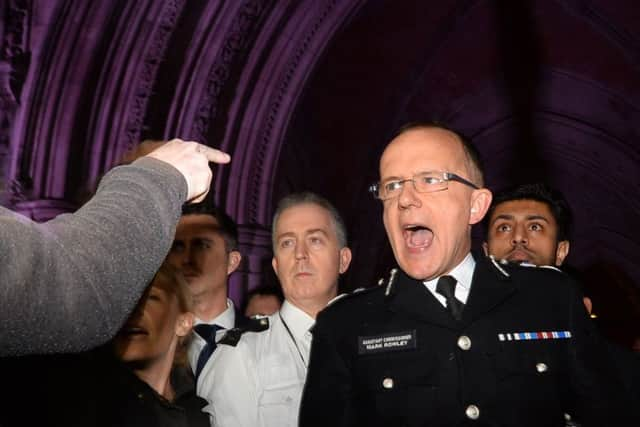Mark Duggan: Anger as jury clears police


Mark Duggan, whose death sparked protests that exploded into the worst rioting and looting England has seen in a generation, was gunned down when police stopped the taxi in which he was travelling in Tottenham, north London, in August 2011.
Relatives of the dead man last night insisted he had been “executed” by police, after the jury decided he had been in possession of a handgun but had thrown it away before being shot. Dramatic scenes erupted in Court 73 of the Royal Courts of Justice as the jury of seven women and three men delivered a verdict of lawful killing. In emotional outbursts, family and friends branded police “murderers” and hurled abuse.
Advertisement
Hide AdAdvertisement
Hide AdThe verdict was greeted by shouts of “rubbish”, and signs and furniture were thrown by people leaving the building.


Duggan’s brother Marlon shouted and swore at the jurors as they left court, and angry supporters spilled from the courtroom and kicked at a door.
The majority ruling was “perverse”, the family’s lawyer said, to a chorus of “no justice, no peace” from supporters. Metropolitan Police assistant commissioner Mark Rowley tried to make a statement on the steps of the court but was drowned out by people shouting “murderer” and “murdering scum”.
Others called out: “Who killed Mark Duggan? The police killed Mark Duggan.”
As security staff tried to shield the officer, chants of “liars, racists, murderers, scum” rang out.
Community leaders last night said they were “nervous” about what reaction the verdict would provoke in wider communities.
There was an increased police presence across London in a bid to avoid a repeat of the scenes that followed the shooting.
Ken Hinds, of the Harringay stop and search monitoring group, said he was nervous about the consequences of the verdict and said Mr Duggan had been made a “scapegoat” for unrest that spread across the UK.
Advertisement
Hide AdAdvertisement
Hide Ad“Mark was not the reason the riots took place,” he said. “This was symptomatic of an ongoing thing in the black community, which has seen members shot down in questionable circumstances. In this case, police got it very wrong.”
Eight out of the ten jurors found Mr Duggan was lawfully killed by a police marksman, who believed he was still armed.
The jurors said the 29-year-old father of six did have a gun while in a taxi stopped by police acting on intelligence.
However, nine of the ten agreed he threw his weapon away before being shot. This, they said, was how it came to be found lying 20yd away from his body, on the other side of a fence. But they accepted that the police marksman feared Duggan remained armed and posed a threat to himself and others.
Mr Duggan’s aunt, Carole Duggan, said: “The majority of the people in this country know that Mark was executed. We are going to fight until we have no breath left in our body for Mark and his children.”
His brother, Shaun Hall, said: “We came for justice today. We don’t feel we are leaving with justice.”
The family’s solicitor, Marcia Willis Stewart, said: “Today we have had what we can only call a perverse judgment.
“The jury found that he had no gun in his hand and yet he was gunned down. For us that’s an unlawful killing.”
Advertisement
Hide AdAdvertisement
Hide AdShe added: “The family are in a state of shock and we would ask you respect their shock.
“They can’t believe that this has been the outcome. No gun in his hand and yet he was killed – murdered. No gun in his hand.”
Mr Duggan’s mother Pamela, visibly distraught, did not speak as she was comforted by relatives. But the 55-year-old, who is battling cancer for a second time, had earlier called police “trigger-happy” bullies.
Police watchdog the Independent Police Complaints Commission (IPCC) said it was looking at new evidence that had emerged from the inquest, and the Duggan family was now considering whether to try to get the inquest conclusion judicially reviewed.
Deborah Coles, from the charity Inquest, said: “As far as the family and the community are concerned, this isn’t the end. They will continue to strive for justice.”
In a statement issued later through Scotland Yard, Mr Rowley said: “No officer sets out at the start of the day to run an operation that results in someone dying. So our sympathy today is with Mark Duggan’s family. They have lost a loved one.
“But the task our officers face in making split-second decisions when confronting armed criminals means there is a risk – a very small risk – that this will happen.”
He said he would meet the Duggan family to discuss the case.
Advertisement
Hide AdAdvertisement
Hide AdMr Duggan was being followed by officers who believed he planned to pick up a gun from another man, Kevin Hutchinson-Foster – who has since been found guilty of supplying a gun to Mr Duggan.
The inquest jury found police had not done enough to gather intelligence about the possibility of Mr Duggan collecting the gun. But they found the car he was travelling in had been stopped in a way that “minimised to the greatest extent possible recourse to lethal force”.
They all believed Mr Duggan had a gun with him in the taxi, but the jurors could not agree on what happened next.
Eight said he threw the gun away prior to police arriving, but one believed this happened as he attempted to evade police. The remaining juror said he was not convinced Mr Duggan threw the weapon away, as no witness gave evidence supporting this.
Tottenham MP David Lammy, whose constituency was at the heart of the 2011 riots, said questions had to be answered to allow relations between community and police to heal.
“Despite this [conclusion], the reputation of the Metropolitan Police has not emerged unscathed,” he said. “There are fundamental and lingering issues that the IPCC investigation - now reopened - must attempt to clarify.”
London mayor Boris Johnson expressed his sympathy for Mr Duggan’s family while emphasising the “incredible pressure” under which firearms officers operated.
Violence that erupted in flames and looting
THE killing of Mark Duggan was like a lit match tossed onto the kindling of urban London.
Advertisement
Hide AdAdvertisement
Hide AdFor five nights, the English capital burned as thousands of people took to the streets, attacking police cars, a magistrates court, buses, businesses and homes.
The violence spread to other English cities, although it did not touch Scotland.
Officers from north of the Border did travel south to help beef up the thin blue line as police struggled to contain some of the worst disorder seen in a decade.
About 3,000 arrests were made in aftermath of the disorder, including 1,800 by the Metropolitan Police, often using CCTV footage to trace people after the event.
Most of the charges laid were for burglary, adding weight to senior officers’ claims that the protests quickly created a window of opportunity for organised criminals who cared little about the death of a 29-year-old man in Tottenham.
In London, most of the rioting took place in Hackney, Brixton, Chingford, Walthamstow, Peckham, Enfield, Battersea, Croydon, Ealing, Barking, Woolwich, Lewisham and East Ham.
Between 8 and 10 August it spread to Birmingham, Bristol, and Manchester in particular. A former nightclub was destroyed in a fire in Portsmouth.
Amid the scenes of emergency services trying to quell mass unrest and put out fires, were stories of ordinary people.
Advertisement
Hide AdAdvertisement
Hide AdPauline Pearce, 45, a West Indian grandmother, became known as the “heroine of Hackney” after she was videoed telling rioters to “stop burning people’s shops”.
Two men were also captured on camera appearing to go to the aid of a Malaysian student who had been knocked to the ground – only to then steal his backpack and run off.
John Kafunda and Reece Donovan, of east London, were jailed for four and five years respectively for robbing Ashraf Rossli, 20, who had been in the UK for only a month at the time.
By September, the Ministry of Justice said 1,566 people that have appeared before magistrates in connection to the riots.
Of those, 1,027 had been in London, 190 in Greater Manchester, 132 in the West Midlands, 67 in Merseyside and 64 in Nottingham.
Meanwhile, two men were jailed for attempting to incite disorder through social media.
Jordan Blackshaw, 20, and Perry Sutcliffe-Keenan, 22, created Facebook pages urging people to riot in areas in the north-west of England.
TIMELINE
The shooting of Mark Duggan, 29, and the chain of events that followed.
Advertisement
Hide AdAdvertisement
Hide Ad• 4 August, 2011: A minicab passenger is shot dead by police in north London. He is later named as Mr Duggan, a father of six.
• 6 August: Two police cars are attacked as more than 100 people march through Tottenham demanding “justice” over the death.
• 7 August: Riots break out in London. People are injured, shops trashed and looted, and buses set alight.
• 8 August: Riots spread to other UK cities. Hundreds arrested. Stephen Kavanagh of the Met apologises to Mr Duggan’s family for not meeting their needs better.
• 9 August: Inquest into Mr Duggan’s death hears he died of a single gunshot wound to the chest.
• 10 August: David Cameron chairs another meeting of the emergency Cobra committee to discuss the continuing unrest.
• 11 August: Parliament is recalled to discuss the emergency.
• 12 August: Police watchdog admits it may have wrongly led journalists to believe that Mr Duggan fired at officers before he was killed.